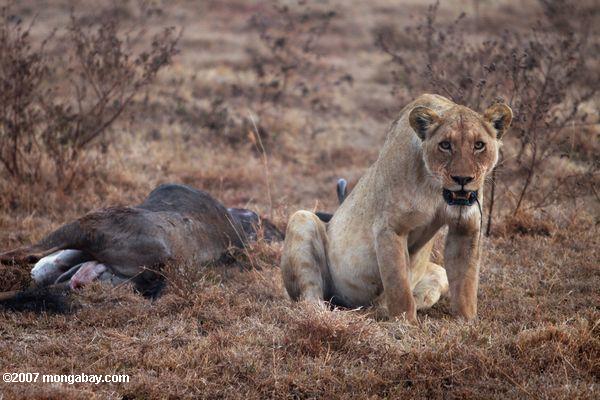Poaching in the Serengeti linked to poverty, high legal hunting prices

In the effort to protect the Serengeti—arguably Africa's most famous ecosystem—one of the major problems is the bushmeat trade. Population growth, little available protein, poverty, and a long-standing history of hunting has led many communities to poach wildlife within Serengeti National Park. Interviewing over a thousand community members in the western Serengeti, scientists found that community members are largely aware that wildlife hunting is illegal and that conservation of wild species is important, but hunt animals anyway partly out of necessity.
"Communities in western Serengeti are involved in wildlife hunting
not because they lack knowledge about the illegality of wildlife hunting
and the importance of conservation of wildlife species, but because they
lack alternative sources of meat," the researchers write in the new
study in mongabay.com's open access journal
Tropical Conservation Science. They further note that despite
promises, local communities find little economic gain from the park.
Hunting by permit is legal in parts of Serengeti National Park, but the
researchers write that local communities avoid legal hunting because the
price is far too high. Most legal hunters in the region are foreign
trophy hunters.
"They are neither able to afford licensing fees nor allowed to use
traditional weapons under the current legislation," the researchers
write. "In reality, legal hunting is not an option for local people in
areas like Serengeti, since no hunting quotas are granted to local
people at affordable terms. For local hunters, the economic benefits
from sales of illegally acquired bush meat are far greater than the
costs associated with a low probability of arrest and prosecution. The
result is a persistent problem for wildlife conservation."
In order to mitigate poaching by local communities, the researchers
recommend programs and initiatives to diversify incomes, reduce poverty,
increase food security, and provide better wildlife and conservation
education in the western Serengeti.
CITATION:Bitanyi, S., Nesje, M., Kusiluka, L. J. M., Chenyambuga, S. W.
and Kaltenborn, B. P. 2012.
Awareness and perceptions of local people about wildlife hunting in
western Serengeti communities. Tropical Conservation Science Vol.
5(2):208-224.